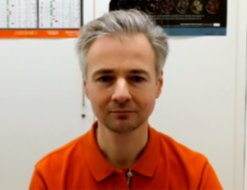Frédéric EBSTEIN - Greifswald - Germany
-
On 18 March 2022Amphi Denis Escandefalse false
-
11h30
Perturbations of the ubiquitin-proteasome system (UPS) and their roles in causing autoinflammatory and neurological phenotypes
Perturbations of the ubiquitin-proteasome system (UPS) and their roles in causing autoinflammatory and neurological phenotypes
Frédéric EBSTEIN, PhD
Research Associate/Lecturer,
Institute for Medical Biochemistry and Molecular Biology
University Medicine Greifswald (UMG)
17475 Greifswald, Germany
Abstract
My long-term-research interest is devoted to understanding the regulation of protein breakdown by the ubiquitin-proteasome system (UPS) in eukaryotic cells. In this pathway, proteins destined for degradation are tagged with ubiquitin moieties prior to their subsequent degradation by 26S proteasomes. It is well appreciated that this process supplies antigenic peptides for MHC class I presentation to activate CD8+ cytotoxic T lymphocytes (CTL). However, it became rapidly evident that the role of the UPS was not necessarily restricted to MHC class I antigen presentation and this observation has shifted my research interests towards the field of proteostasis, namely the mechanisms ensuring the maintenance of a healthy proteome in the cell. To specifically address the involvement of the UPS in proteostasis, I joined the group of Prof Elke Krüger as a Research Associate at the University Medicine Greifswald (UMG). Together, we identified the UPS as a major contributor to proteostasis whose genetic disruption may be causative of various autoinflammatory diseases referred to chronic atypical neutrophilic dermatosis with lipodystrophy and elevated temperature (CANDLE) syndromes. Interestingly, our recent collaborations with the group of Prof Stéphane Bézieau from the University of Nantes have shown that UPS loss-of-function mutations could also result in the acquisition of neurodevelopmental disorders (NDD). Although being clinically distinct, we could demonstrate that both CANDLE and NDD were interferonopathies characterized by the persistent expression of a type I interferon (IFN) gene signature in blood This observation led us to hypothesize that proteostasis perturbations are danger signals triggering sterile innate immune responses. Our short-term goals in this regard are to clarify the mechanisms by which impaired proteostasis drives autoinflammation and to assess the impact of type I IFN on neurogenesis.
Biography
Frédéric Ebstein received his MSc and PhD degrees from the University of Nantes in 2001 and 2005, respectively. His doctoral research in the lab of Marc Grégoire essentially focused on the relevance of cell death as a source of antigens for cross-presentation by dendritic cells. In 2005, he joined the lab of Peter-Michael Kloetzel at the Charité University Medicine of Berlin (Germany) to study the regulatory determinants of the ubiquitin-proteasome system (UPS) for MHC class I antigen processing. He received his habilitation from the Charité in the field of Biochemistry in 2017. The same year, he moved to the University Medicine of Greifswald (Germany) to join the group of Elke Krüger as a Research Associate to investigate the implication of proteostasis perturbations in inflammatory processes. He is a certified lecturer (venia legendi) in the field of Biochemistry in both Berlin and Greifswald medical universities.






